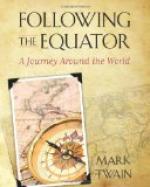I wanted to see him do more miracles; and so, just for the pleasure of hearing him answer, I asked him about Hertzegovina, and pariah, and unique. But he began to generalize then, and show distress. I saw that with New Zealand gone, he was a Samson shorn of his locks; he was as other men. This was a curious and interesting mystery, and I was frank with him, and asked him to explain it.
He tried to avoid it at first; but then laughed and said that after all, the matter was not worth concealment, so he would let me into the secret. In substance, this is his story:
“Last autumn I was at work one morning at home, when a card came up—the card of a stranger. Under the name was printed a line which showed that this visitor was Professor of Theological Engineering in Wellington University, New Zealand. I was troubled—troubled, I mean, by the shortness of the notice. College etiquette required that he be at once invited to dinner by some member of the Faculty—invited to dine on that day—not, put off till a subsequent day. I did not quite know what to do. College etiquette requires, in the case of a foreign guest, that the dinner-talk shall begin with complimentary references to his country, its great men, its services to civilization, its seats of learning, and things like that; and of course the host is responsible, and must either begin this talk himself or see that it is done by some one else. I was in great difficulty; and the more I searched my memory, the more my trouble grew. I found that I knew nothing about New Zealand. I thought I knew where it was, and that was all. I had an impression that it was close to Australia, or Asia, or somewhere, and that one went over to it on a bridge. This might turn out to be incorrect; and even if correct, it would not furnish matter enough for the purpose at the dinner, and I should expose my College to shame before my guest; he would see that I, a member of the Faculty of the first University in America, was wholly ignorant of his country, and he would go away and tell this, and laugh at it. The thought of it made my face burn.




